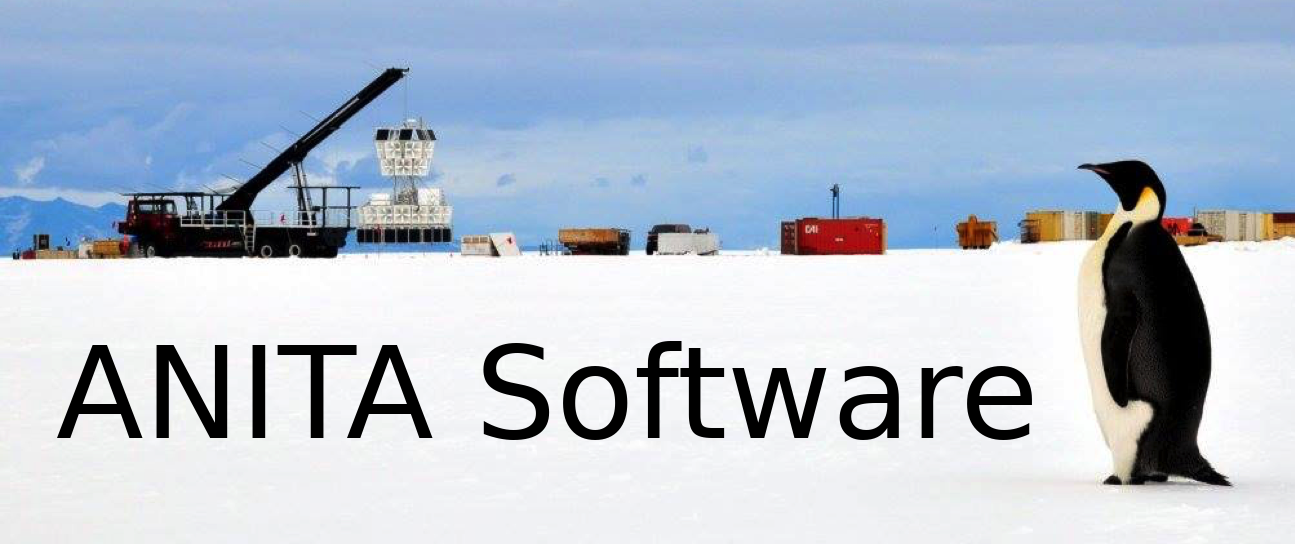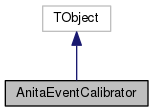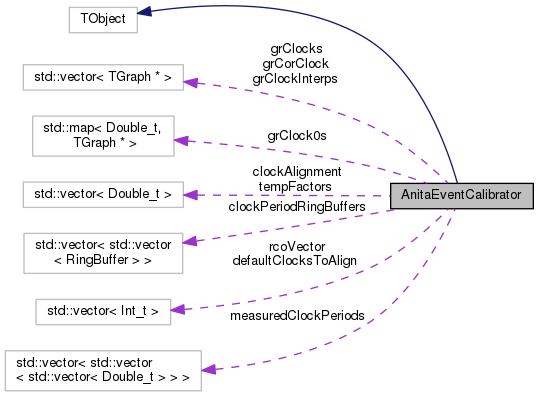 |
 |
AnitaEventCalibrator – The ANITA Event Calibrator. More...
#include <AnitaEventCalibrator.h>
Public Member Functions | |
| Int_t | calibrateUsefulEvent (UsefulAnitaEvent *eventPtr, WaveCalType::WaveCalType_t calType) |
| Calibration Routine The routine that is used to calibrate the voltage time waveforms in a UsefulAnitaEvent. More... | |
| void | guessRco (UsefulAnitaEvent *eventPtr) |
| Guess RCO from clock. | |
| void | getTempFactors (UsefulAnitaEvent *eventPtr) |
| Interface to RingBuffer of clock periods for temperature correction. | |
| void | updateTemperatureCorrection (UsefulAnitaEvent *eventPtr) |
| Update RingBuffer for this event. More... | |
| Int_t | unwrapChannel (UsefulAnitaEvent *eventPtr, Int_t surf, Int_t chan, Int_t rco, Bool_t fApplyTempCorrection, Bool_t fAddPedestal, Double_t *voltsArray, Double_t *timeArray, Int_t *scaArray) |
| void | applyVoltageCalibration (UsefulAnitaEvent *eventPtr) |
| void | keepOnlySomeTimeAfterClockUptick (TGraph *grClock, Double_t deltaClockKeepNs) |
| std::vector< Double_t > | getClockAlignment (UsefulAnitaEvent *eventPtr, Int_t numPoints[12], Double_t volts[12][9][260], Double_t times[12][260]) |
| std::vector< Double_t > | getClockAlignment (UsefulAnitaEvent *eventPtr, Int_t numPoints[12], Double_t volts[12][9][260], Double_t times[12][260], std::vector< Int_t > listOfClockNums) |
| void | deleteClockAlignmentTGraphs () |
| void | zeroMeanNonClockChannels () |
| Double_t | getTimeOfZeroCrossing (Double_t x1, Double_t y1, Double_t x2, Double_t y2) |
| Int_t | getTimeOfUpwardsClockTicksCrossingZero (Int_t numPoints, Int_t surf, Double_t *times, Double_t *volts, std::vector< Double_t > &timeZeroCrossings, std::vector< Int_t > &sampZeroCrossings, bool raiseFlagIfClocksAreWeird) |
| void | findExtremaSamples (Int_t length, Double_t *volts, std::vector< Int_t > &maximaSamps, std::vector< Int_t > &minimaSamps) |
| void | initializeVectors () |
| Double_t | convertRfPowTodBm (int surf, int chan, int adc) |
| Double_t | convertRfPowToKelvin (int surf, int chan, int adc) |
| AnitaEventCalibrator () | |
Static Public Member Functions | |
| static AnitaEventCalibrator * | Instance (int version=0) |
| Instance generator. | |
Public Attributes | |
| Double_t | voltsArray [12][9][260] |
| Channel volts in mV. | |
| Double_t | timeArray [12][260] |
| Channel times in ns. | |
| Int_t | numPointsArray [12] |
| Number of samples in each channel. | |
| Int_t | scaArray [12][260] |
| Capacitor numbers for each sample. | |
| std::vector< std::vector< RingBuffer > > | clockPeriodRingBuffers |
| Holds rolling average of temperature correction. | |
| std::vector< Double_t > | tempFactors |
| Multiplicative factor for deltaTs & epsilons accounting for temperature. | |
| std::vector< Int_t > | rcoVector |
| The output of AnitaEventCalibrator::guessRco() goes here. | |
| std::vector< std::vector< std::vector< Double_t > > > | measuredClockPeriods |
| Double_t | relativeCableDelays [12][9][4] |
| From AMPA inputs to digizier delays. | |
| Double_t | relativePhaseCenterToAmpaDelays [12][9] |
| From phase center to AMPAs (hopefully) | |
| Double_t | deltaTs [12][4][2][260] |
| Calib constants: The time for the write pointer to travel between successove capacitors. | |
| Double_t | epsilons [12][4][2] |
| Calib constants: time (ns) for write pointer to go from sample 255 -> 0 (in ANITA-2 and ANITA-3 with the LAB-3 digitizers) | |
| Double_t | mvCalibVals [12][9][4] |
| Calib constants: converts from ADC counts to millivolts. | |
| Double_t | clockKeepTime [12][4] |
| How much time after clock up-tick to keep, calib food. | |
| Int_t | firstHitBusRcoLatchLimit |
| std::vector< Int_t > | defaultClocksToAlign |
| List of SURFs for getClockAlignment() (for calibration progs) | |
| std::vector< TGraph * > | grClockInterps |
| Interpolated clocks. | |
| std::map< Double_t, TGraph * > | grClock0s |
| Need to process clock 0 depending on needs of other SURF. | |
| std::vector< TGraph * > | grCorClock |
| std::vector< TGraph * > | grClocks |
| std::vector< Double_t > | clockAlignment |
| Double_t | dtInterp |
| Interpolating clock for alignment step. | |
| Double_t | nominalDeltaT |
| If we don't want bin-to-bin deltaTs. | |
| Int_t | fClockProblem |
| Flag raised if more than 4 or less than 2 upgoing zero crossings in a SURF clock. | |
| Int_t | fClockSpike |
| Flag raised if the voltage is too large or too small in Surf clock. | |
| Double_t | RfPowYInt [12][9] |
| Double_t | RfPowSlope [12][9] |
AnitaEventCalibrator – The ANITA Event Calibrator.
Used to calibrate the raw ANITA data into voltage-time waveforms
Definition at line 46 of file AnitaEventCalibrator.h.


| AnitaEventCalibrator::AnitaEventCalibrator | ( | ) |
< From what capacitor number to trust latched RCO value.
< in nanoseconds, for clock alignment interpolation
< in nanoseconds
< If unreasonable number of zero crossings in clock, raise flag & skip temp correction update
Definition at line 24 of file AnitaEventCalibrator.cxx.
| Int_t AnitaEventCalibrator::calibrateUsefulEvent | ( | UsefulAnitaEvent * | eventPtr, |
| WaveCalType::WaveCalType_t | calType | ||
| ) |
Calibration Routine The routine that is used to calibrate the voltage time waveforms in a UsefulAnitaEvent.
The routines to calibrate a RawAnitaEvent into an UsefulAnitaEvent. The exact type of calibration applied depends on the WaveCalType::WaveCalType_t selected.Workhorse
The plan for calibration happiness: Step 1: figure out from WaveCalType_t calType exactly what we're going to do Step 2: Remove the spiky clock Step 3: Figure out RCO phase from clock period (if bin-to-bin dts required) Step 4: Update rolling temperature correction (+copy to event) Step 5: Unwrap all channels (if requested) Step 6: Apply bin-to-bin timing (if requested) Step 7: Apply voltage calib (if requested) Step 8: Find trigger jitter correction Step 9: Zero mean all non-clock channels Step 10: Apply channel-to-channel cable delays Step 11: Copy everything to UsefulAnitaEvent
Step 1: figure out from WaveCalType_t calType exactly what we're going to do.
Step 3: Figure out RCO phase from clock period (if bin-to-bin dts required)
< If we have an issue with the clock (more than 4 zero crossings or less than 3) then we raise this flag to not update rolling average temperature correction.
Step 4: Update rolling temperature correction (copy to usefulAnitaEvent)
< This is pretty important as RCO guess needs accurate clock
Steps 5: Unwrap all channels (if requested)
Step 6: Apply bin-to-bin timing (if requested)
Step 7: Apply voltage calib (if requested)
Step 8: Find trigger jitter correction
Step 9: Zero mean all non-clock channels
Step 10: Apply channel-to-channel cable delays Step 11: Copy voltage, time (with cable delays) & capacitor arrays to UsefulAnitaEvent
Definition at line 116 of file AnitaEventCalibrator.cxx.
| void AnitaEventCalibrator::initializeVectors | ( | ) |
< Very important this doesn't start at 0, things will break if it does!
Definition at line 93 of file AnitaEventCalibrator.cxx.
| Int_t AnitaEventCalibrator::unwrapChannel | ( | UsefulAnitaEvent * | eventPtr, |
| Int_t | surf, | ||
| Int_t | chan, | ||
| Int_t | rco, | ||
| Bool_t | fApplyTempCorrection, | ||
| Bool_t | fAddPedestal, | ||
| Double_t * | voltsArray, | ||
| Double_t * | timeArray, | ||
| Int_t * | scaArray | ||
| ) |
< Used to count how many extra capacitors to include after the wrap around
< Each LAB has its own set of deltaTs and epsilons
< Given by firmware
< Given by firmware
< nextExtra used for deciding whether or not to insert capacitors after 255
< sum of times of those extra capacitors
< This is the time of the first capacitor.
This is Andres's 220ps minimum sample separation
Definition at line 1428 of file AnitaEventCalibrator.cxx.
| void AnitaEventCalibrator::updateTemperatureCorrection | ( | UsefulAnitaEvent * | eventPtr | ) |
Update RingBuffer for this event.
N.B. This function relies on the results of the guessRCO() to have the measured clock periods
Definition at line 848 of file AnitaEventCalibrator.cxx.
 1.8.11
1.8.11